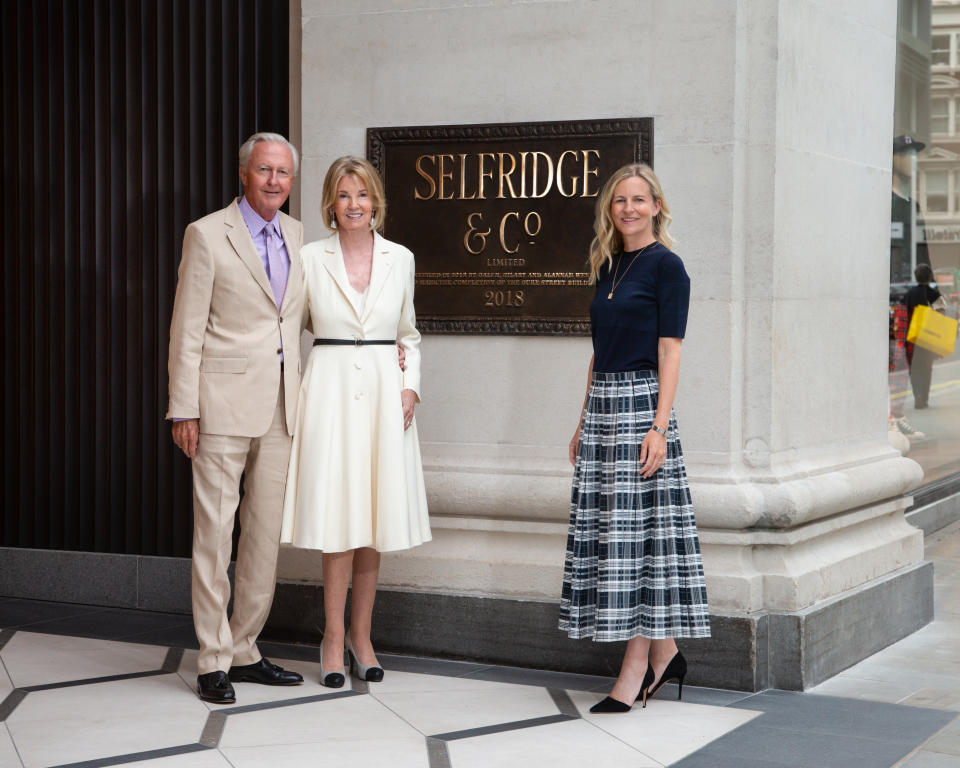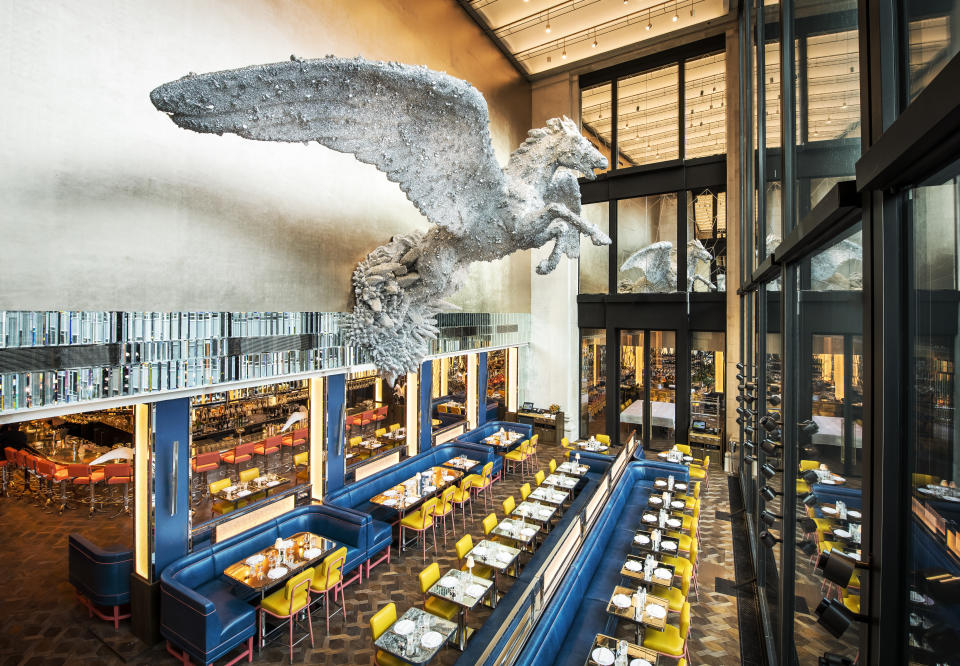Selfridges’ New Owners Bank On a Retail Renaissance in City Centers

LONDON — Britain’s Boxing Day sales may have been disappointing due to Omicron, but the lackluster footfall during the holiday season, and on U.K. high streets generally, did little to deter Selfridges’ new owners from spending billions to purchase the company and expanding one of the few Europe-wide department store groups.
Thailand’s Central Group and Austria’s Signa, which purchased Selfridges Group in a pre-Christmas deal said to be worth 4 billion pounds, are taking the long view on U.K. and European retail, banking on the future of physical stores and the return of consumers to city streets and dynamic shopping spaces.
More from WWD
Selfridges unveils Europe's FAO Schwarz flagship destination
Nine Places To Visit Between Your Nine-To-Five Shows at LFWM
Pat McGrath's 'A Technicolour Odyssey' Launch Party at Selfridges
On Monday Selfridges declined to give any details, data, or color about its post-Christmas Boxing Day sale. The retailer usually takes the first day of the sale as an opportunity to trumpet footfall, top-selling items, and dizzying bargains in-store and online.
Not this year.
While crowds may have gathered outside the entrance to Selfridges U.K. stores on Sunday morning, the Boxing Day sales were largely a washout, according to Springboard, which measures retail footfall across the U.K.
Footfall across the country was 41 percent lower than on Boxing Day 2019, with high streets faring “only marginally better” than shopping centers, according to Springboard. In London’s central West End shopping district, where Selfridges is located, footfall was down 41.2 percent compared with two years ago.
Diane Wehrle, insights director at Springboard, blamed the double-digit decline largely on “consumers’ ongoing nervousness about the COVID-19 infection rate.” While Sunday is generally a slower day for retail compared with the rest of the week, Wehrle said “the mild weather should have meant that it was easy for shoppers to visit stores and destinations.”
Selfridges’ new owners, who entered into a 50-50 partnership to buy the group last week, are looking beyond all the COVID-19 related crises to a brighter future for the group, and for retail generally.
The deal includes 18 department stores, including Selfridges in London, Manchester and Birmingham, England; de Bijenkorf in the Netherlands, and Brown Thomas and Arnotts in Ireland. The stores’ associated e-commerce platforms and real estate properties in London, Manchester, and Ireland are also in the mix.
When the sale was revealed in the late hours of Dec. 23, Stefano Della Valle, chairman of CGE Investments Ltd., the European arm of Central Group, said the acquisition represents “a huge vote of confidence in both city center retail and the future of the department store.”
He said the city center stores are of value because they are interwoven into the fabric of city life. “We take a long-term view that people live and visit cities because they want to socialize, eat, drink, shop and enjoy incredible experiences, and we are confident that when the pandemic recedes, these joys in life will return.”
Dieter Berninghaus, chairman of the executive board of Signa, said the owners would not only enrich the store estate in the coming years, but continue to prioritize sustainability as well.
“Together we will work with the world’s leading architects to sensitively reimagine the stores in each location, transforming these iconic destinations into sustainable, energy-efficient, modern spaces, whilst staying true to their architectural and cultural heritage,” he said.
“We plan to fulfill the vision of the late [group founder] Galen Weston to deliver his master plan, and create a high-quality experience retailing environment for our customers and brand partners.”
Although the owners did not give many details, they said the plan is to develop the site adjacent to the Oxford Street flagship. A vast, raw space, it has been used until now for events, fashion shows, and large-scale installations.
Tos Chirathivat, executive chairman and chief executive officer of Central Group, said that Central and Signa would focus on delivering “exceptional and inclusive store and digital experiences for local residents and overseas visitors alike to ensure we can give all the stores in Selfridges Group a bright future for the next 100 years.”
A report published last week showed that Central and Signa aren’t the only ones considering the bigger picture, and the enduring allure of city center shopping.
BNP Paribas Real Estate and retail market research company Locatus looked at the most frequented shopping streets in 34 metropolises.
Among the European capitals’ mass market shopping arteries, London’s Oxford Street — home of Selfridges’ flagship — ranked at number one, with 72,700 people daily. London’s Regent Street, home to mass and luxury stores, came third with 56,900 people daily.
Chances are that once COVID-19 recedes, and international travel picks up, those streets — and other once-thriving thoroughfares across Europe — will be swarming with shoppers once again.
As reported, the transaction will see Selfridges Group become part of the combined Central and Signa portfolio of luxury department stores, which includes Rinascente in Italy, Illum in Denmark, Globus in Switzerland, and The KaDeWe Group, which operates in Germany and Austria, by 2024.
The annual turnover for the combined department stores portfolio was 5 billion euros in 2019, and is projected to grow to more than 7 billion euros by 2024.
Central and Signa will operate all the stores in Selfridges Group. They will continue to be run by the existing leadership teams, as well as their e-commerce platforms and operating companies.
The Canadian business, Holt Renfrew, will remain with the Weston family.
Alannah Weston, chairman of Selfridges Group, said: “The acquisition of Selfridges Group by Central and Signa is testament to the successful realization of my father’s vision for an iconic group of beautiful, truly experiential, department stores. Creative thinking has been at the heart of everything we did together for nearly 20 years, and sustainability is deeply embedded in the business. I am proud to pass the baton to the new owners who are family businesses that take a long-term view. I know they will fully embrace that vision and continue to empower our incredible team to take the group from strength to strength.”
Anne Pitcher, global managing director of Selfridges Group, said: “We are joining an impressive group of leading luxury department stores across Europe, presenting a fantastic opportunity for the business and reinforcing our leading status and position in global retail.”
Central Group and Signa had been tipped as the frontrunners in the British press, and have teamed on big retail deals before, notably buying the Swiss department store chain Globus, and KaDeWe in Berlin.
Central is controlled by the Chirathivat family, and operates retail businesses in Thailand and Vietnam, as well as in Europe.
In the past, the company has made no secret of its intentions to expand through acquisitions in Europe and Asia, and said it has little interest in the U.S. market.
“It’s a very big market, very advanced. It’s very sophisticated, whereas in Europe, we feel that we can buy these stores and improve them,” said Chirathivat in an interview with WWD in 2017.

Signa Group is an international investment and industrial holding company that’s active in the real estate, retail and media business sectors. It was founded in 1999, and describes itself as one of Europe’s most important real estate investors.
Its holdings range from the Hotel Bauer Palazzo in Venice to KaDeWe; the German retail chain Galeria Karstadt Kaufhof; Eataly, and the Chrysler Building in New York. It also owns Signa Sports United, which operates around 80 web shops for sports fans in 17 countries.
Signa said it will continue to supplement its real estate investments with acquisitions and new projects in top locations “with significant value creation potential.”
The pre-Christmas deal marks a homecoming for Vittorio Radice, a non-executive board member of Central Group and vice chairman of Rinascente.
Radice turned Selfridges, which was founded in 1908 by the American Harry Gordon Selfridge, from a sleepy department store into a retail sensation. He served as managing director of Selfridges between 1996 and 2003, and picked up early on the experiential trend, opening up the store’s ground-floor space, and giving it the feel of an open-air marketplace, and creating themed store takeovers.
After a stint at Marks & Spencer’s home division, Radice joined Rinascente as CEO in 2005, with a mandate to revitalize the Italian department store.
It is understood that he was instrumental in putting this latest deal together.
The deal also marks the first time that Selfridges will not have owners with strong ties to the U.K. Harry Gordon Selfridge was American, but spent most of his career in England. Galen Weston was born in Buckinghamshire, England, and his wife Hilary is originally from Dublin. Galen Weston and his family lived between Canada, the U.S. and London, and Alannah Weston remains based in London with her family.
The Weston family is a regular fixture on The Sunday Times of London Rich List. In 2021, they saw their wealth rise by 470 million pounds to 11 billion pounds, making them the 10th richest family in the U.K., according to an annual ranking. They were the only retail family to land in the top 10 in 2021.
Selfridges began exploring a sale earlier this year following the death of Galen Weston at age 80 after a long illness. It was working with Credit Suisse on finding a buyer for its U.K., Irish and Dutch businesses.
Galen Weston, who purchased Selfridges in 2003, lived and breathed retail, and it was clear his heirs did not have the appetite to carry on managing Selfridges, or the other stores in the group.
During his long career, the late Weston sat at the helm of food, retail, and real estate companies in North America, the U.K., and Europe.
He assembled Selfridges Group. His other businesses included Loblaw and Choice Properties in Canada.

Matt Writtle/Courtesy
Weston retired as chairman of George Weston Ltd. in 2016 to continue his philanthropic work through the Weston Family Foundation in Canada and the Selfridges Group Foundation in the U.K.
He stepped down as chairman of Selfridges Group two years ago, making way for his daughter Alannah.
On Weston’s watch, Selfridges opened a $64 million store in Birmingham that spanned 270,000 square feet. It was designed by Future Systems, the architecture firm famous for its dreamy, whimsical designs. The store looks like a spaceship from the outside.
Weston was singular in his vision for Selfridges: Shortly after acquiring the store he put the stops on further expansion plans in smaller English cities such as Bristol, Leeds and Newcastle. Instead, he redirected the money to Selfridges’ existing units in London, Birmingham and Manchester, with the core strategy of making every Selfridges “an innovative, dramatic place to shop.”
In London, he went about refurbishing the Oxford Street flagship’s food hall, created a travel department, and boosted investment in the homeware department.

Weston did not see Selfridges as competing with U.K.-based retailers, such as Harrods and Harvey Nichols — his vision was always broader than that.
“Our main competition isn’t the other department stores. It’s cinemas, restaurants and any place where customers will go to spend their leisure time,” said a Selfridges spokeswoman in 2003.
At the time of her father’s death, Alannah Weston said the luxury retail industry “has lost a great visionary. His energy electrified those of us who were lucky enough to work alongside him to reimagine what customer experience could be. He had real integrity, tremendous curiosity and a huge sense of fun. His positive outlook, faith in great people and excitement about the future will always be part of Selfridges Group and who we are.”
The Weston family poured millions into refurbishing the store over the years, including a major overhaul of the ground floor accessories space at the Oxford Street flagship.
In 2018 Selfridges in London became home to the largest luxury accessories hall in the world, a 60,000-square-foot expanse of large and small leather goods, gifts, jewelry and eyewear. It was the fruit of a 300 million pound, multiyear project.
The new accessories hall, on the eastern end of the store, makes up one-third of Selfridges’ ground floor and one-tenth of the 600,000-square-foot Oxford Street flagship.
The space features floor-to-ceiling windows and is also home to The Corner Shop, which hosts a series of innovative concepts and brands.
“The boundaries are blurring between the street, the windows and the retail space,” said Sebastian Manes, Selfridges’ buying and merchandising director, in 2018. “We’ve never had windows like this before, and it’s so much brighter. You can see the sky — and you can walk in the windows.”
Manes said Selfridges’ ambitions are big for the hall: “We didn’t want a corporate approach with just one shop after another. We wanted a revolution. It was about how we get people to shop in a different way.”
It has also embraced sustainability with its Project Earth strategy, a vision to “reinvent retail and change the way we shop and how we do business by 2025.” The strategy, according to Selfridges, is built on three themes — transitioning to more sustainable materials, exploring new business models, and challenging mindsets.
Selfridges has said that by 2025 the group will ensure that all of its “environmentally impactful materials” come from certifiable sustainable sources.
Pitcher told WWD in December 2020 that Project Earth is meant “to change the way we shop,” and to help customers consume as responsibly as possible by 2025. Selfridges customers can now rent designer outfits, buy vintage designer clothing from Oxfam, refill beauty products to save on plastics, and have their accessories mended with the Selfridges “repair” concierge.
“In the future, retailers can be anything — they can be houses of content and experience. They can be places to educate visitors, places that blend the physical and digital. If we can listen and act on what we hear, we can be a vital part of customers’ lives. The best shops are not just shops, they are social spaces that are an essential part of the communities they inhabit,” Pitcher said.

Matt Writtle
Sign up for WWD's Newsletter. For the latest news, follow us on Twitter, Facebook, and Instagram.

